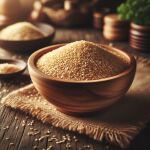Eliminate cholesterol with this hot infusion, according to science
Scientific studies have shown that green tea can reduce LDL cholesterol....
Table of Contents
- Properties of green tea and its impact on cholesterol
- Optimal Dose and Bioactive Components
- Cautions and quality of green tea
- Tips for incorporating green tea into your diet
Follow Patricia Alegsa on Pinterest!
High cholesterol is a health problem that affects millions of people globally, increasing the risk of cardiovascular diseases.
It is recommended to make lifestyle changes, such as adopting a balanced diet and exercising regularly, in addition to consuming certain beneficial foods and drinks.
One tea that helps reduce cholesterol is green tea, highly valued for its properties.
Scientific studies have shown that green tea can lower LDL cholesterol, known as "bad cholesterol," thanks to the presence of bioactive compounds that break down fats and improve lipid profile.
Properties of green tea and its impact on cholesterol
According to an article from EatingWell, the antioxidants in green tea offer multiple health benefits, including reducing cholesterol and preventing cancer. Nutritionist Lisa Andrews highlights the importance of adding green tea to a healthy diet.
Research indicates that polyphenols, such as catechins found in tea leaves, act as antioxidants.
A 2023 study found that people with type 2 diabetes who drank three cups of green tea per day saw a decrease in their total cholesterol levels.
However, additional dietary factors were not controlled for, so it is not possible to attribute this reduction solely to green tea.
A systematic review supports these findings, suggesting that green tea may lower total and LDL cholesterol.
In my clinical practice, I have seen promising results in my patients.
For example, Ana, a 45-year-old patient with a history of high cholesterol, incorporated green tea into her daily diet and, in combination with a balanced diet and exercise, reduced her LDL cholesterol levels by 15% in three months.
Ana drank two to three cups of unsweetened green tea per day and opted for organic products to avoid pesticides and other contaminants.
You can also improve cholesterol levels by consuming legumes, learn more in this article: How to lower cholesterol by eating legumes.
You can also improve cholesterol levels by consuming legumes, learn more in this article: How to lower cholesterol by eating legumes.
Optimal Dose and Bioactive Components
Studies indicate that the optimal dose for reducing cholesterol with green tea is not clearly defined and may vary according to individual factors. Catechins such as epigallocatechin gallate (EGCG) are especially effective.
Umo Callins highlights that EGCG has been widely researched for its effectiveness in cholesterol reduction and inhibition of lipid absorption in the intestine.
One of my patients named Juan, a 52-year-old man with a history of high cholesterol and overweight, found that drinking three cups of green tea a day helped lower his LDL cholesterol.
He combined this practice with a diet rich in fruits, vegetables, and healthy fats, achieving a significant improvement in his lipid profile within six months.
Want to eat something delicious to live longer? I'll tell you in this article: How to live over 100 years by eating this delicious food.
Want to eat something delicious to live longer? I'll tell you in this article: How to live over 100 years by eating this delicious food.
Cautions and quality of green tea
Despite the potential benefits of green tea, more studies are needed to confirm these effects.
Wan Na Chun emphasizes that the FDA has not approved health claims related to green tea and the reduction of cardiovascular risk, so it is advisable to consult a doctor before using green tea to control high cholesterol levels.
Green tea, which contains caffeine, can cause side effects if consumed in excess.
To reap the benefits of green tea, it is crucial to choose high-quality products without added sugars. Callins recommends avoiding green tea with excess sugar and opting for products tested for pesticides and contaminants.
Chun also warns about the potential side effects of herbal teas when combined with certain medications.
I had a patient, Laura, who experienced palpitations and anxiety when consuming large amounts of green tea due to its caffeine content.
After reducing the amount to one cup a day and opting for a high-quality decaffeinated variety, she enjoyed the antioxidant benefits without adverse effects.
Tips for incorporating green tea into your diet
To enjoy green tea safely, it is suggested to incorporate it into a balanced diet, avoiding excess caffeine and sugar.
Recipes like jasmine iced tea with mint and lemon or hot tea with honey are healthy and delicious options.
For example, Marcos, a 60-year-old patient, achieved a notable reduction in his cholesterol levels by incorporating iced green tea with lemon and mint into his diet. This refreshing drink became his favorite during the summer, helping him stay hydrated and healthy.
Ultimately, adding green tea to your diet can be an effective strategy for reducing cholesterol when combined with a healthy diet and exercise, based on the successful experiences of my patients.
It is always recommended to consult with a healthcare professional before making significant changes to your diet or lifestyle.
I recommend you to keep reading this article: Losing weight using the Mediterranean diet.
Subscribe to the free weekly horoscope
Aquarius Aries Cancer Capricorn Gemini Leo Libra Pisces Sagittarius Scorpio Taurus Virgo
-
 Microscopic fossils allow us to know how to combat global warming
Microscopic fossils allow us to know how to combat global warming
Microscopic fossils reveal how ancient global warming events, linked to volcanic activity, help to understand current climate change. -
 Benefits of sesame seeds: how many should you consume per day?
Benefits of sesame seeds: how many should you consume per day?
Sesame seeds are rich in nutrients such as calcium and healthy fats. Add them to salads, smoothies, or bread. -
 The 5-4-3-2-1 technique: simple and effective for combating stress
The 5-4-3-2-1 technique: simple and effective for combating stress
Discover the 5-4-3-2-1 technique: a powerful tool to reduce stress by connecting with the present through your senses: seeing, touching, hearing, smelling, and tasting. -
 Survival in Avalanches: How Long Can a Human Endure in the Snow?
Survival in Avalanches: How Long Can a Human Endure in the Snow?
Discover how long a human can survive under a snow avalanche. A mountaineer in Bariloche survived 'by a miracle'. Learn about the science behind it! -
 Why Does Time Fly as We Age? Discover the Science Behind It
Why Does Time Fly as We Age? Discover the Science Behind It
Discover why years fly by as we age: psychology and neuroscience reveal how metabolism, routine, and experiences influence our perception of time.
I am Patricia Alegsa
I have been writing horoscope and self-help articles professionally for over 20 years.
Subscribe to the free weekly horoscope
Receive weekly in your email the horoscope and our new articles on love, family, work, dreams and more news. We do NOT send spam.
Astral and numerological analysis
-
 Discover your future, secret personality traits and how to improve in love, business and life in general
Discover your future, secret personality traits and how to improve in love, business and life in general
-
 Online Dream Interpreter: with artificial intelligence
Do you want to know what a dream you had means? Discover the power of understanding your dreams with our advanced online dream interpreter using artificial intelligence that responds to you in seconds.
Online Dream Interpreter: with artificial intelligence
Do you want to know what a dream you had means? Discover the power of understanding your dreams with our advanced online dream interpreter using artificial intelligence that responds to you in seconds.
-
 Supplements to Improve Memory in Older Adults
Supplements to Improve Memory in Older Adults
Study reveals that fiber supplements improve memory in older adults. Discover how to care for your brain with these surprising findings! -
 9 Expert Keys for Deep and Restorative Sleep
9 Expert Keys for Deep and Restorative Sleep
Discover 9 expert keys for uninterrupted sleep. Small changes in your habits can transform your rest into a restorative experience. -
 Yoga combats the effects of aging according to Harvard
Yoga combats the effects of aging according to Harvard
Discover how yoga combats aging. Strengthen body and mind with this ancient practice. Improve your quality of life with each pose! -
 Strengthen Your Spine and Sleep Better: The Science-Backed Method
Strengthen Your Spine and Sleep Better: The Science-Backed Method
Discover the science-backed method to strengthen your spine and sleep better: low-impact exercises that relieve persistent lower back pain. -
 Revolutionary therapy for hormonal deficiency: the case of Messi
Revolutionary therapy for hormonal deficiency: the case of Messi
Discover the innovative diagnosis of Leo Messi at 19 years old and the new therapy that could revolutionize the treatment of somatropin deficiency. -
 Why do aerosol insecticides fail against cockroaches?
Why do aerosol insecticides fail against cockroaches?
Aerosol insecticides do not eliminate all cockroaches, especially German ones. Scientists from Kentucky and Auburn emphasize the need for new control strategies. -
 Why were no human remains found on the Titanic?
Why were no human remains found on the Titanic?
Discover the enigma of the Titanic: why were no human remains found? A fascinating mystery that intrigues both explorers and scientists alike. -
 What does it mean to dream of squid?
What does it mean to dream of squid?
Discover the meaning behind your dreams with squid. Do they represent hidden fears or an opportunity for prosperity? Find answers in this article. -
 What does it mean to dream of slugs?
What does it mean to dream of slugs?
Discover the fascinating world of slug dreams. Learn their meaning and the possible messages your subconscious is sending you - read more here! -
 What does it mean to dream of hands?
What does it mean to dream of hands?
Discover the intriguing world of dreams and the meaning of dreaming about hands. What secrets does this dream hide? Find out everything in our article. -
 The fiction became reality! The real stalker from the Netflix series threatened the journalist with 30 messages
The fiction became reality! The real stalker from the Netflix series threatened the journalist with 30 messages
Incredible: after the conversation he had with the harassing woman, the journalist from the British newspaper reported being harassed with numerous threatening calls and voicemail messages. -
 What does it mean to dream of nails?
What does it mean to dream of nails?
Discover the meaning behind dreams with nails - are they long and beautiful or broken and ugly? Find out what your subconscious is telling you. -
 The death of Pope Francis: what his birth chart said
The death of Pope Francis: what his birth chart said
Pope Francis's birth chart, influenced by Sagittarius, Aquarius, and Cancer, reveals his free and protective spirit. Beatriz Leveratto unravels his reformist essence.